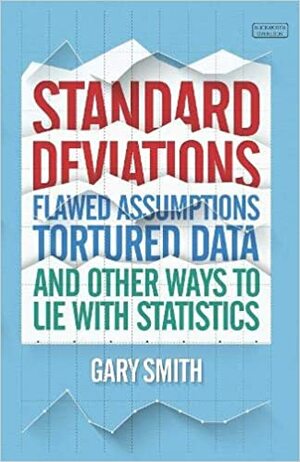
Standard Deviations: Flawed Assumptions, Tortured Data, and Other Ways To Lie With Statistics
by Gary Smith
Genres: Non-fiction, SciencePages: 304
Rating:

Synopsis:Did you know that having a messy room will make you racist? Or that human beings possess the ability to postpone death until after important ceremonial occasions? Or that people live three to five years longer if they have positive initials, like ACE?
All of these 'facts' have been argued with a straight face by researchers and backed up with reams of data and convincing statistics. As Nobel Prize-winning economist Ronald Coase once cynically observed, 'If you torture data long enough, it will confess.' Lying with statistics is a time-honoured con.
In Standard Deviations, economics professor Gary Smith walks us through the various tricks and traps that people use to back up their own crackpot theories. Sometimes, the unscrupulous deliberately try to mislead us. Other times, the well-intentioned are blissfully unaware of the mischief they are committing. Today, data is so plentiful that researchers spend precious little time distinguishing between good, meaningful deductions and total rubbish. Not only do others use data to fool us, we fool ourselves.
Gary Smith’s Standard Deviations is basically a primer on how to notice when data is being manipulated in some way. Some of it is obvious (omitting zero from a graph’s axes can obliterate scale; reporting only some of the data from an experiment means likely the effect disappears when using the full data; p = 0.05 still means the result is a coincidence 5% of the time), and some of it less so — though to some extent I likely find it familiar/obvious because some grounding in statistics is required to study biology and especially infectious diseases.
For me, the book was far longer than it needed to be, with some principles repeated in multiple places (even without counting the final summing-up chapter). I can imagine that others would find multiple examples and reinforcement of the ideas helpful, though.
Overall, it felt surprisingly dated for a book published in 2014. I think that’s down to the examples used, and some difficult-to-put-one’s-finger-on attitude on the part of the author — it feels like you could mention sexism, racism, etc, etc, and he’d go look at the data with his initial starting point being “you’re wrong”. That may be unfair, it’s a very personal reaction to not-very-much actual evidence.
And admittedly, he got my back up immediately by opining on cephalopod intelligence in a way that demonstrated he clearly didn’t know the first thing about cephalopod intelligence. Stay in your lane and write about what you understand, Mr Smith.
Rating: 2/5

He’s an Ivy League macro-economist born in 1945 whose specialty is the stock market, so I suspect your gut reaction is spot-on.
I also find these folks tend to be able to argue whatever they want from data. Ironically, given the purpose of the book…
Ooh, those look like some fun new acqusitions. Have you read Yong’s book on bacteria? “I Contain Multitudes”.
I did, quite a long time ago! My review.